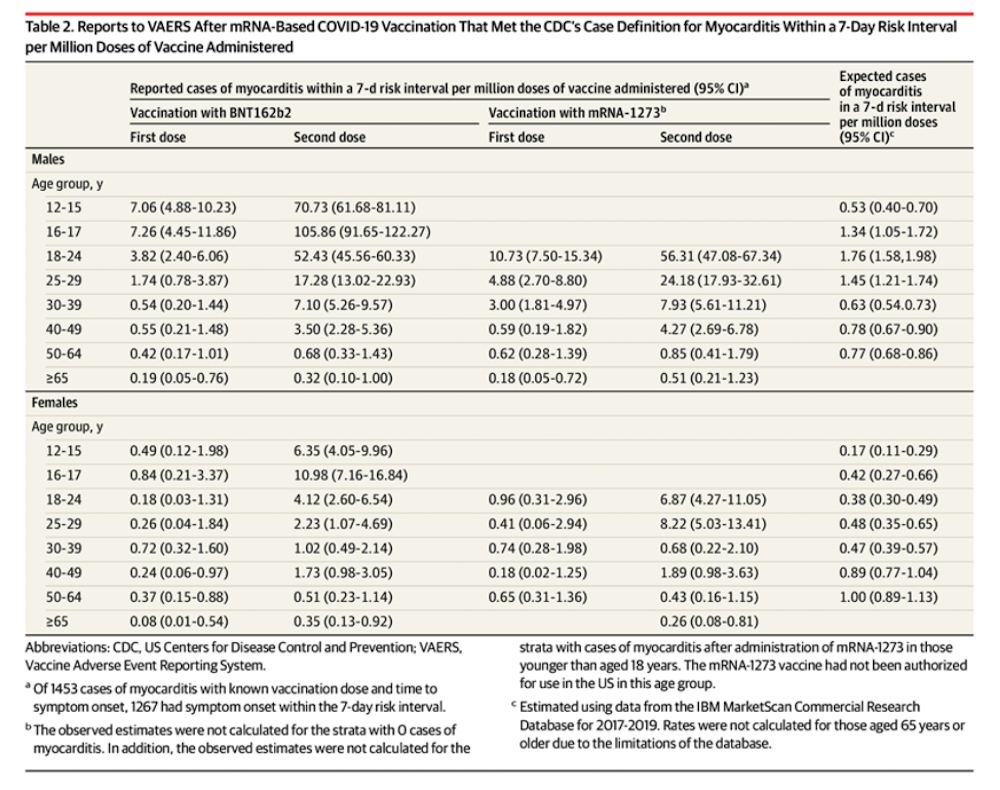Study finds heart inflammation risk 133x greater for teenage boys after Pfizer’s COVID shot

(LifeSiteNews) – Pfizer’s COVID-19 shot is associated with a 133-times greater risk of heart inflammation for teenage boys, according to a new study in the Journal of the American Medical Association (JAMA).
The study, published last month by researchers with the U.S. Centers for Disease Control and Prevention (CDC), found that myocarditis skyrocketed in men between 12 to 24 years old after both Pfizer’s and Moderna’s mRNA COVID jabs, Israel National News reported.
Myocarditis is a type of heart inflammation that has repeatedly been linked to COVID vaccines. The study authors noted that the condition can be serious and can lead to heart failure and death.
The researchers said that “the risk of myocarditis after receiving mRNA-based COVID-19 vaccines was increased across multiple age and sex strata,” but that the disease particularly impacts young men. Eighty-two percent of myocarditis cases examined in the study were in males, and the median age of patients was 21. The vast majority of cases – 82 percent – followed a second shot.
The risk was highest after Pfizer vaccination. Boys between 12 and 15 years old had a myocarditis rate of 70.7 cases of per million Pfizer doses – 133 times higher than the background rate of .53 per million, according to the study. For young men ages 16 to 17, the rate was 106 cases per million doses, a 79-times increase from the baseline risk of 1.34 cases per million doses.
The myocarditis rate in men between 18 and 24 years old was 52.4 cases per million Pfizer shots and 56.3 per million Moderna doses. The background rate was just 1.76 per million doses.


The study analyzed data from the Vaccine Adverse Event Reporting System (VAERS), a vaccine injury tracking system managed by the CDC and U.S. Food and Drug Administration (FDA), from December 2020 to August 2021. Out of 1,991 VAERS reports of myocarditis after COVID-19 vaccination, 1,626 met the CDC’s case definition, according to the researchers.
The most common symptoms included abnormal ECG or cardiac MRI results (72 percent) and chest pain or discomfort (89 percent). Around 30 percent of patients also reported shortness of breath, and 9 percent had heart palpitations. Symptoms typically developed within two days of inoculation, the authors said.
Ninety-six percent of patients were hospitalized, and 13 percent continued to have symptoms after being discharged from the hospital.
The myocarditis cases are most likely underestimated, the CDC study emphasized. VAERS is a passive surveillance system, and research shows that it significantly undercounts vaccine injuries.
Other recent studies have found even greater COVID vaccine-related heart inflammation risks for young men. A November article from Hong Kong estimated that one in 2,680 boys between 12-17 years old will develop the condition within two weeks of a second Pfizer dose.
A study by Israeli researchers the following month put the risk at one in 6,600 for men ages 16-19 vaccinated with Pfizer. The Israeli study reported an 81 percent hospitalization rate for myocarditis cases and a death rate of nearly one percent.
And a large British study late last year found that the risk of myocarditis in men under 40 is several times higher than average after Pfizer or Moderna vaccination and that post-vaccine heart inflammation may be more lethal than other forms of the disease. Of the patients hospitalized after taking the Pfizer shot, 14 percent died, compared with 9 percent of those without a recent mRNA vaccine.
Even people with apparently mild cases may still experience long-term problems, such as greater risk of heart attacks later in life, experts have warned. The American Heart Association and the American College of Cardiology advise that patients should refrain from sports for three to six months after myocarditis and that further mRNA-based COVID jabs should be deferred, according to the January CDC study.
The COVID vaccines have been linked to various other serious side effects, like the immune disorder Guillain Barré Syndrome and blood clots.
At the same time, the shots have proved unable to stop transmission of the virus. Data has shown that vaccinated people have had higher infection rates than the unvaccinated and have driven record COVID spikes around the world in recent weeks.
Young people have virtually nonexistent risks of death or serious illness due to COVID-19. Between 0.00-0.01 percent of all child coronavirus cases in the U.S. have resulted in death, according to the American Academy of Pediatrics. Stanford University medical professor Dr. John Ionnidis estimated that the survival rate of the virus is 99.986 percent for people between 20 and 29 years old and no lower than 99.7 percent for people under 60.
(https://www.lifesitenews.com/news/study-finds-133x-risk-of-heart-inflammation-after-pfizer-covid-19-shot-in-teenage-boys/)
No hay comentarios:
Publicar un comentario